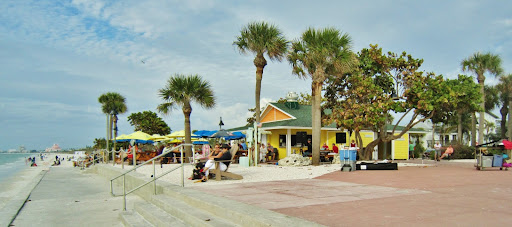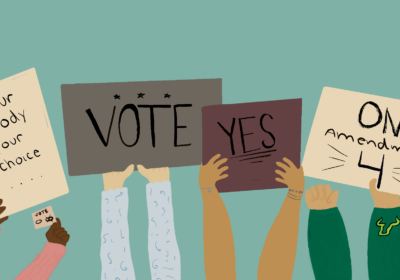OPINION: It’s the holiday season. Give the coral a break too.

More than five million people visit the Florida Keys each winter, according to Travel and Leisure. As we approach the holidays and the long-awaited winter break, many USF students will flock to the beaches for a tropical holiday season. Perhaps the only benefit of global warming is that beach weather persists through much of South Florida’s winters.
After record water temperatures this summer, Florida reefs experienced unprecedented bleaching. This is when corals expel the algae they house, turning white. Continuous bleaching weakens and eventually kills these corals.
Related: USF St. Pete prepares to begin construction on new environmental research and teaching facility
Florida is home to the world’s third largest barrier reef but recent studies have found that nearly 70% of the corals are eroding, according to NOAA’s Atlantic Oceanographic and Meteorological Laboratory.
However, bleaching is not the only coral killer. It is more likely than not that your sunscreen is harming Florida corals.
USF students must educate themselves on the value of Florida’s depleting reefs and take small measures to help such as wearing reef-safe sunscreen.
Non-reef-safe sunscreens include many chemicals harmful to corals, most prominently oxybenzone or octinoxate, according to National Geographic. These chemicals make corals more susceptible to bleaching, alter their genetic makeup, cause abnormal skeleton growth and deform baby corals.
Sophomore marine biology major Leah Hodges has developed a passion for coral conservation. She completed a project in May 2022 looking into the effects of sunscreen on the oceans, and she recently presented her independent research studying oceanography and U.S. policy.
In a Nov. 14 interview with Hodges, she explained that corals are more than just beautiful ocean organisms, they are essential to supporting 25% of marine life despite covering only 2% of the ocean floors – but this number is consistently lowering.
One drop of non-reef-safe sunscreen has the potency to reach across six olympic sized swimming pools of water, thus reaching masses of coral.
The economic benefits of coral are vast and the Florida reefs are essential to the state economy, according to Hodges. These corals have an estimated value of $8.5 billion, and they contribute $4.4 billion in local sales, $2 billion in local income and provide over 70,000 jobs according to the Florida Keys National Marine Sanctuary.
The continued depletion of these corals will prove detrimental to the Florida economy.
Hodges hopes to share her passion and teach her fellow classmates about the importance of protecting the Florida corals. She urges fellow students to stay reef-conscious.
One way to do this is to only purchase reef-safe sunscreen, especially when visiting South Florida beaches. Some reef-safe brands include SunBum, Supergoop and Colorescience which range in price from $11 to $50 respectively and can be bought at drugstores, beauty stores, many grocery stores or online.
Popular non-reef-safe brands to look out for are Coppertone, Hawaiian Tropic and Banana Boat priced between $8 and $20. Though many brands are beginning to switch their products to reef safe, not all products on the shelf have been switched, so it is still important to look out for reef-safe labels.
Most reef-safe sunscreens say so on the bottle. If not, you can look for the chemicals oxybenzone or octinoxate. If those are listed, the sunscreen is not reef-safe.
While many students are not aware of the current threats to reef life, it is their job to educate themselves. And once they understand the problem, they must be proactive in being part of the solution by making more thoughtful consumer choices.
The alarming decline of Florida’s coral reefs, exacerbated by factors like rising water temperatures and harmful sunscreen chemicals, demands attention and action. By choosing reef-safe sunscreens, we can help ensure that future holidays in South Florida remain vibrant and sustainable for us and the precious marine ecosystems that surround us.
As you enjoy the sun, the sand and the sea, think not what the ocean can do for you, but what you can do for the ocean.






